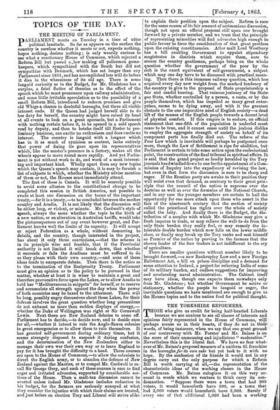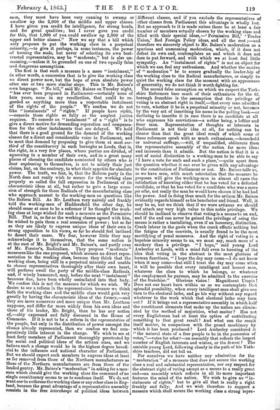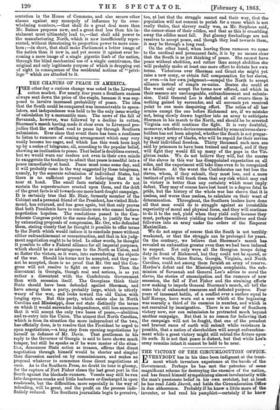THE YORKSHIRE REFORMERS.
THOSE who give us credit for being half-hearted Liberals because we are anxious to see all classes of interests and opinions fairly represented in the House of Commons, will perhaps accuse us in their hearts, if they do not ia their words, of being insincere, when we say that one great ground of our controversy with Mr. Forster and Mr. Baines is on the score of their unmeaning and injudicious " moderation." Nevertheless this is the literal fact. We have no fear what- ever of Mr. Baines'a proposed measure of a uniform 61. franchise in the boroughs for its own sake but yet look to it with no hope. By the confession of its friends it would not in any degree carry out the only purpose for which a Reform Bill is worth carrying at all,—the representation of the characteristic ideas of the working classes in the House of Commons. Mr. Baines eulogizes it . on this very ac- count in words which we venture to think carry its con- demnation. " Suppose there were a town that had 200 voters, it would henceforth have 300, or a town that had 2,000 voters would henceforth have 3,000. Surely if every one of that additional 1,000 had been a working
arm, they must have been very cunning to swamp or swallow up the 2,000 of the middle and upper classes.
E have given you credit for intelligence, for strong heads, and for great qualities ; but I never gave you credit for this, that 1,000 of you could swallow up 2,000 of the tipper and better classes." Now we say that a bill which only proposes to put the working class in a perpetual eninority,—to give it perhaps, in some instances, the power .of turning the scale, but never of selecting its own best- trusted representative, may be "moderate," but is also un- meaning,—unless it be grounded on one of two equally false and dangerous assumptions.
The first is that such a measure is a mere " instalment," in other words, a concession that is to give the working class no direct power now, but the hope of even absolute power after one or two more similar steps. This is Mr. Baines's own language. "No bill," said Mr. Baines on Tuesday night, *I has ever been proposed in Parliament—certainly none of ante years, none in my recollection, that could be re- garded as anything more than a respectable instalment of the rights of the people." We confess we do not dike "instalments" of "rights." If people have rights, --concede those rights as fully as the amplest justice requires. To concede an " instalment " of a " right" is to give a direct motive for demanding reparation and compensa- tion for the other instalments that are delayed. We hold that there is a good ground for the demand of the working -classes for a direct and considerable voice in Parliament, and to meet that demand by proposing to give them at most one- third of the constituency in such boroughs as Leeds, that is, the right, in a very few places, where parties are divided, of squeezing in a member of their own, and in a great many places of choosing the candidate nominated by others who is least unpleating to themselves, is not to satisfy their just claims, but, on the contrary, to whet their appetite for absolute power. The truth, we fear, is, that the Reform party in the North does not really wish to secure for the working class properly so called the full expression in Parliament of its characteristic ideas at all, but rather to gain a large acces- sion of strength for those Radicals of the manufacturing class who approach nearest to the working-men on questions like the Reform Bill. As Mr. Leathern very naively and frankly told the working-men of Huddersfield the other day, he -should cease at once to be a reformer if he thought the work- ing class at large wished for such a measure as the Permissive Bill. That is, so far as the working classes agreed with him, be wished to gain them a real accession of power ; but so far as they are likely to express unique ideas of their own in strong opposition to his views, so far he should feel inclined to desert their cause. We fear, however little they may acknowledge it to themselves, that the same notion is at the root of Mr. Bright's and Mr. Baines's, and partly even of Mr. Forster's, Radicalism. They propose " moderate " .measures like the one proposed, which secures no direct repre- sentation to the working class, because they think that the working class, being still in a perpetual minority and unable to choose representatives thoroughly after their own heart, will perforce swell the party of the middle-class Radicals, and, if wisely humoured, may, before the next "instalment" becomes due, have been wholly assimilated into that body. We confess this is not the measure for which we wish. We *desire to see a reform in the representation because we think both the working class and the middle class would gain very greatly by having the characteristic ideas of the former,—and they are more numerous and more unique than Mr. Leatham supposes, and differ far more widely from his own ideas and those of his leader, Mr. Bright, than he has any notion of,—ably expressed and fully discussed in the House of Commons. If it is not to be a reform in the representation of the people, but only in the distribution of power amongst the classes already represented, then we confess we feel com- paratively little interest in the change. We wish to see at least forty members of Parliament thoroughly penetrated by the social and political ideas of the artizan class, and we believe such a change would be in the highest degree benefi- cial to the influence and national character of Parliament. But we should expect such members to express ideas at least as far removed from those of the Northern manufacturers as those of the Northern manufacturers are from those of the landed gentry. Mr. Baines's "moderation" in asking for a mea- sure which should give the working class the command of no single constituency seems to us to condemn itself. We do not want eve,-to enthrone theworking class or any other class in Eng- land, because the great advantage of a representative assembly consists is the free interchange of political ideas between
different classes, and if you exclude the representatives of other classes from Parliament this advantage is wholly lost. But no approach to it is made unless there be at least a fair number of members actually chosen by the working class and filled with their special ideas,—' Permissive Bill,' Trades Union,' Red Foreign Policy ideas, and all the rest ;—and therefore we sincerely object to Mr. Baines's moderation as a spurious and unmeaning moderation, which, if it does not defeat its own end, contemplates an end which it does not dare to put forward, and with which we at least feel little sympathy. An "instalment of rights" is not an object for which we can feel any enthusiasm. And whether the motive of " moderation " be to secure gradually the leadership of the working class to the Radical manufacturers, or simply to quiet the working class for the moment with an appearance of generosity, we do not think it worth fighting for.
The second false assumption on which we suspect the York- shire Reformers base much of their enthusiasm for the 6/. borough franchise is the assumption that the privilege of voting is an abstract right in itself,—that every man admitted to vote, whether it be in a perpetual minority or not, becomes by the very act of inscribing his name in the polling book—or declining to inscribe it in case there is no candidate at all who expresses his convictions—a nobler being, a loftier and freer man. Representation of thoughts or interests in Parliament is not their idea at all, for nothing can be clearer than that the great ideal result of which some of these reformers speak with so much enthusiasm,—household or universal suffrage,—will, if unqualified, obliterate from the representative assembly of the nation far more ideas and interests than it admits. But the notion is that it is a sort of social distinction to a working-man to be able to say I have a vote for such and such a place,'—quite apart from the question whether it can ever be given with any advantage to the constitution of Parliament or not. Mr. Baines tells us, as we have seen, with much ostentation that the measure he proposes will give the working-man in almost all cases the satisfaction of knowing either that he has voted for a defeated candidate, or that he has voted for a candidate who was a mere pis aller, not really the man he would have chosen if he had had the power. And in doing thus much for the artizan Mr. Baines evidently regards himself as his benefactor and friend. Well, it may be so, but we think that if we were artisans we should not attach any very high value to this noble privilege. We should be inclined to observe that voting is a means to an end, and if the end can never be gained the privilege of using the means is rather a tantalizing, even if an honorary, distinction. Crank labour in the gaols when the crank effects nothing but the fatigue of the convicts, is usually found to be the most mortifying of penal measures. And the right of voting in a hopeless minority seems to us, we must say, much more of a mockery than a privilege. " I hope," said young Lord Amberley at Leeds, with a mind full even to bursting of the idea that voting in the abstract is the most glorious of human functions, " I hope the day may come—I do not know when it may come—but still I trust the day may come when it will be possible that every intelligent and honest man, whatever the class to which he belongs, or whatever the employment he pursues, may be admitted to the exercise of the franchise." Glorious vision ! Magnificent Utopia ! Does not our heart burn within us as we contemplate that splendid possibility, when every intelligent man shall give one turn to the electoral lathe, and go his way without any regard whatever to the work which that electoral lathe may turn out ? If it brings out a representative assembly in which half the constituent elements that make up the nation are elimin- ated by the method of majorities, what matter? Has not every Englishman had at least the option of cwitributing something to that great result? And what can the result itself matter, in comparison with the grand machinery by which it has been produced ? Lord Amberley considered it " the natural state of a free people to be in the possession of votes,"—votes for what?—an assembly that reflects the largest number of English interests and wishes, or the fewest ? The amiable young Lord, following closely in the path of his York- shire teachers, did not tell us. For ourselves we have neither any admiration for the " moderation " of a measure that does not secure the working class a real and substantial representation, nor any respect for the abstract right of voting except as a means to a really great end—an assembly which reflects in all its more important features the mind of the nation. ,,We wish to give no " in-
stalments of rights," but to giiis all that is really a right frankly and fully. And we wish .therefore to support a measure which shall secure the working class a strong repre- sentation in the House of Commons, and also secure other classes against any monopoly of influence by its over- whelming numbers,—that shall do a great deal more than Mr. Baines proposes now, and a great deal less than his in- stalment must ultimately lead to,—that shall add power to the manufacturing North, which is now insufficiently repre- sented, without threatening to proportion power to mere num- bers ;—in short, that shall make Parliament a better image of the nation than it now is, and yet secure it against ever be- coming a mere image of a single gigantic limb of the nation, through the blind mechanical use of a single contrivance, the original and only legitimate purpose of which is dropping out of sight in consequence of the accidental notions of "privi- lege " which are attached to it.
































 Previous page
Previous page